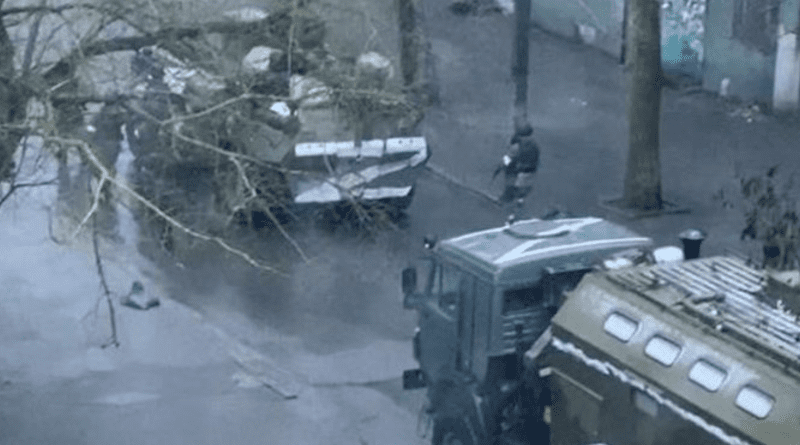Russian Forces Torturing, Unlawfully Detaining Civilians In Ukraine’s South, Reports HRW
Russian forces have tortured, unlawfully detained, and forcibly disappeared civilians in the occupied areas of Kherson and Zaporizhzhia regions, Human Rights Watch said. Russian forces have also tortured prisoners of war (POWs) held there.
“Russian forces have turned occupied areas of southern Ukraine into an abyss of fear and wild lawlessness,” said Yulia Gorbunova, senior Ukraine researcher at Human Rights Watch. “Torture, inhumane treatment, as well as arbitrary detention and unlawful confinement of civilians, are among the apparent war crimes we have documented, and Russian authorities need to end such abuses immediately and understand that they can, and will, be held accountable.”
Human Rights Watch spoke with 71 people from Kherson, Melitopol, Berdyansk, Skadovsk and 10 other cities and towns in the Kherson and Zaporizhzhia regions. They described 42 cases in which Russian occupation forces either forcibly disappeared civilians or otherwise held them arbitrarily, in some cases incommunicado, and tortured many of them. Human Rights Watch also documented the torture of three members of the Territorial Defense Forces who were POWs. Two of them died.
The purpose of the abuse seems to be to obtain information and to instill fear so that people will accept the occupation, as Russia seeks to assert sovereignty over occupied territory in violation of international law, Human Rights Watch said.
People interviewed described being tortured, or witnessing torture, through prolonged beatings and in some cases electric shocks. They described injuries including broken ribs and other bones and teeth, severe burns, concussions, broken blood vessels in the eye, cuts, and bruises.
A formerly detained protest organizer, who requested anonymity, said Russian forces beat him with a baseball bat in detention. Another protestor was hospitalized for a month for injuries from beatings in detention. A third said that after seven days in detention he could “barely walk” and had broken ribs and a broken kneecap.
The wife of a man whom Russian forces detained for four days, following a house search in early July, said his captors beat her husband with a metal rod, used electroshock on him, injured his shoulder, and gave him a concussion.
Describing the pervasive fear, one journalist in Kherson said: “You don’t know when they’ll come for you and when they’ll let you go.”
Former detainees described being blindfolded and handcuffed for the entire duration of their detention and being held with very little food and water and no medical assistance. Russian personnel forcibly transferred at least one civilian detainee to Russian occupied Crimea, where he was forced to carry out “corrective labor.”
In several cases, Russian forces released detainees only after they signed a statement promising to “cooperate” with the authorities or recorded a video in which they exhorted others to cooperate.
In all but one of the detention cases, Russian forces did not tell families where their loved ones were being held, and the Russian military commander’s office provided no information to families seeking it.
The laws of war allow a warring party in an international armed conflict to detain combatants as POWs and to intern civilians in noncriminal detention if their activities pose a serious threat to the security of the detaining authority. Arbitrary detention, unlawful confinement, and enforced disappearances are all prohibited under international humanitarian law and may amount to or involve multiple war crimes. Torture and inhuman treatment of any detainee is prohibited under all circumstances under international law, and, when connected to an armed conflict, constitutes a war crime and may also constitute a crime against humanity.
For civilians, the risk of arbitrary detention and torture under occupation is high, but they do not have a clear option to leave to Ukrainian-controlled territory, Human Rights Watch said. For example, the journalist in Kherson told Human Rights Watch, “I have my own Telegram channel, I’m in their database, I had to go into hiding. I’ve been warned that they can come for me at any time. I don’t risk leaving because I’m on their [blacklist].” Thirteen people who did leave described harrowing trips through numerous Russian checkpoints and detention.
In an interview with Human Rights Watch, Tamila Tasheva, permanent representative of the Ukraine president in Crimea, who also monitors the situation in newly occupied areas in southern Ukraine, said that Ukraine’s authorities cannot verify the exact number of enforced disappearances in Kherson region. She said that human rights monitors estimated that at least 600 people had been forcibly disappeared there since February 2022.
“Ukrainians in occupied areas are living through a hellish ordeal,” Gorbunova said. “Russian authorities should immediately investigate war crimes and other abuses by their forces in these areas, as should international investigative bodies with a view to pursuing prosecutions.”
Russian forces invaded Kherson region, on the Black Sea and Dnipro River, on February 25, 2022, and on March 3 claimed to control its capital, Kherson. It was part of a broader invasion and occupation of Ukraine’s coastal south, which includes Melitopol and Berdyansk, cities in Zaporizhzhia region, and ultimately Mariupol, in Donetsk region.
Ukrainian forces have started preparing a counteroffensive to retake occupied coastal areas, Ukraine’s defense minister said in July. On June 21, an official in the Russian occupation administration stated that a “referendum” on Kherson region “joining Russia” was planned in the fall.
From the start of the occupation, Russian military targeted for detention or capture not only members of Territorial Defense Forces, who should be treated as POWs under international humanitarian law, but also local mayors and other civil servants, police officers, as well as participants in anti-occupation protests, journalists, or others presumed to have security-related information or to oppose the occupation.
Over time Russian forces also started to detain people, apparently at random, according to numerous sources. They also targeted community volunteers who distributed food, medicines, diapers and other necessities, all in very short supply in Kherson, to people in need.

